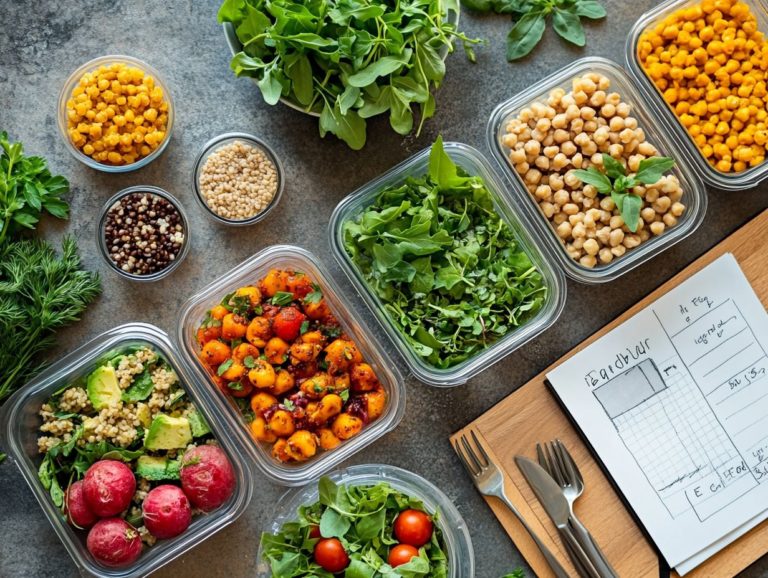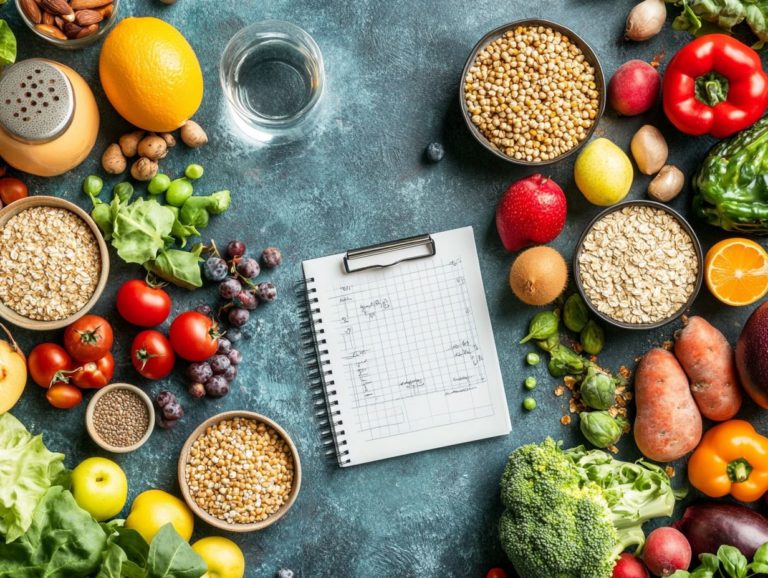The Connection Between Meal Planning and Portion Control
Meal planning transcends mere time-saving; it stands as an essential strategy for creating a healthy lifestyle.
By organizing your meals in advance, you not only streamline grocery shopping and cooking but also lay the groundwork for improved portion control.
This article delves into the myriad benefits of meal planning, guiding you through the process of crafting your own personalized plan while shedding light on its influence on portion sizes.
You’ll find practical tips designed to elevate your success and steer clear of common pitfalls. Get ready to transform your mealtime experience!
Contents
- Key Takeaways:
- The Importance of Meal Planning
- How Meal Planning Can Help with Portion Control
- Tips for Successful Meal Planning and Portion Control
- Frequently Asked Questions
- How are meal planning and portion control connected?
- How does meal planning help with portion control?
- What are the benefits of practicing portion control?
- How can meal planning and portion control be incorporated into a busy lifestyle?
- Are there any tips for successful meal planning and portion control?
- How can meal planning and portion control benefit those with specific dietary needs or restrictions?
Key Takeaways:
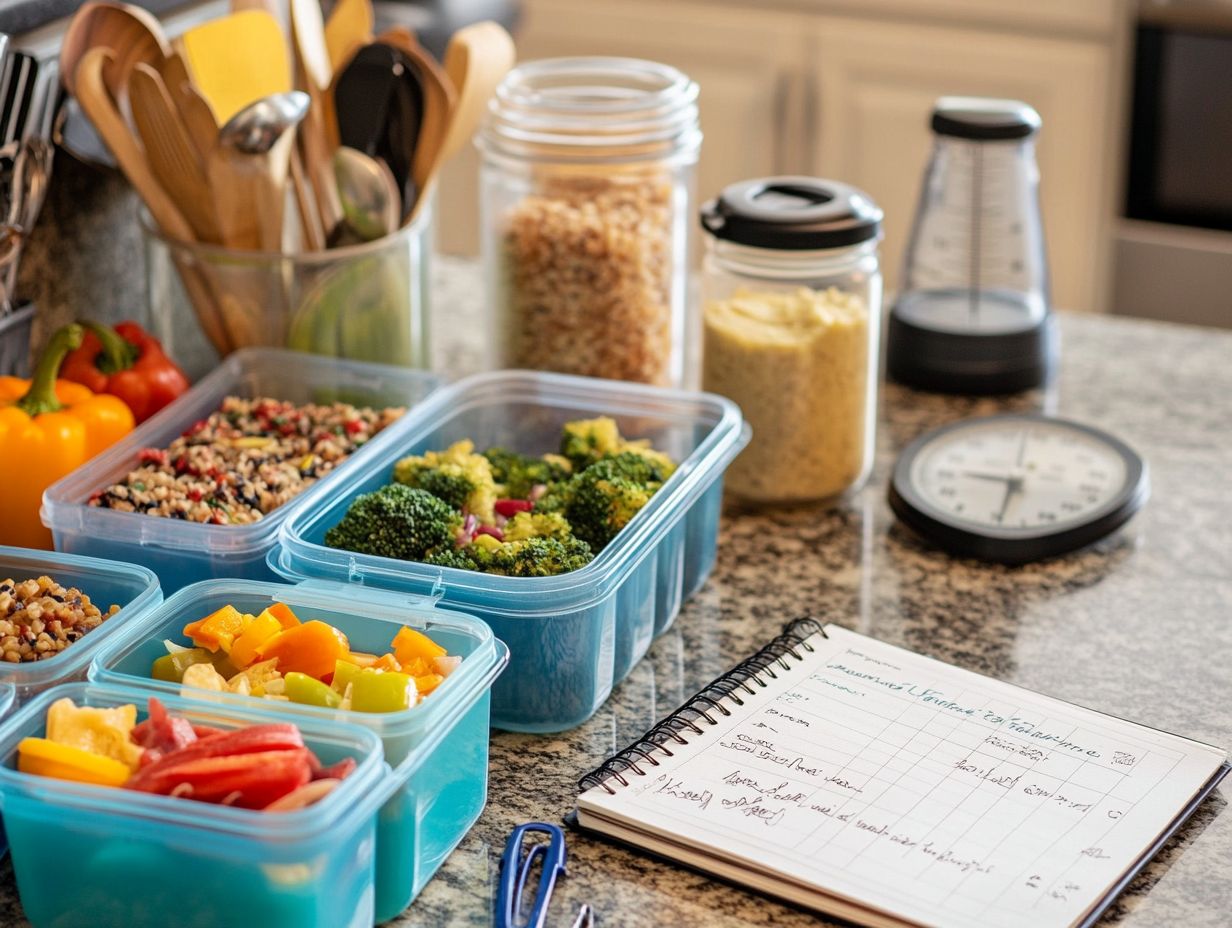
Meal planning is crucial for maintaining a healthy lifestyle as it helps in creating balanced meals and controlling portion sizes.
Portion control is the practice of consciously managing the amount of food consumed, which is essential for weight management and preventing overeating.
To successfully implement meal planning and portion control, practical strategies such as measuring food portions and avoiding distractions while eating should be followed.
The Importance of Meal Planning
Meal planning is a vital practice that elevates your time management skills while developing healthy eating habits and meeting nutritional goals, especially for college students who often encounter challenges such as limited time and food waste.
By adopting a structured approach to meal preparation, you can save money, cut down on food costs, and maintain a balanced diet that incorporates a diverse range of food groups, including fruits, vegetables, healthy fats, and protein sources.
Engaging with a registered dietitian can further refine your efforts, offering personalized dietary guidelines and cooking skills tailored specifically to your health needs.
Understanding Portion Control
Mastering portion control is essential for you to achieve a balanced diet and cultivate healthy eating habits. It directly impacts your food consumption, serving sizes, and nutritional objectives, making it a vital component in the fight against obesity.
By embracing portion control, you’ll not only enhance your overall well-being but also enable yourself to make informed choices that align with your health goals.
Benefits of Planning Meals
Planning your meals comes with a plethora of benefits, including enhanced time management, reduced food waste, and the financial savings that come from being intentional about your diet all while ensuring it aligns with your nutritional goals.
By taking control of your portions and ingredients, you can create meals that taste great and are good for you. A registered dietitian would likely emphasize that this approach nurtures healthier eating habits, steering you toward thoughtful choices rather than impulsive decisions driven by convenience.
For example, rather than succumbing to the allure of expensive meal delivery services that often tempt you with unhealthy options, you can prepare nourishing recipes in advance. This shift doesn’t just save you money over time; it also fosters a richer understanding of nutrition, ultimately paving the way for sustainable lifestyle changes that last.
How to Create a Meal Plan
Creating a meal plan is more than just jotting down a few recipes; it s a sophisticated dance of strategic grocery shopping, time management, and healthy cooking techniques that keep your nutritional goals and portion control in check.
Start by assessing your weekly schedule to pinpoint those precious windows for cooking. This insight will guide you in selecting recipes that are not only delicious but also practical for those hectic evenings.
Next, compile a list of seasonal fruits and vegetables; not only will this elevate the flavors of your meals, but it will also help you stick to your budget, as these fresh items often come at a lower price.
- For portion control, consider using measuring cups or smaller plates these clever visual cues can help you serve just the right amount.
- Ensure your meal plans incorporate a diverse range of ingredients. This variety keeps your meals exciting and nutritious, setting the stage for sustainable healthy eating habits.
Don t wait! Start planning your meals today and see the difference it makes in your life!
What is Portion Control?
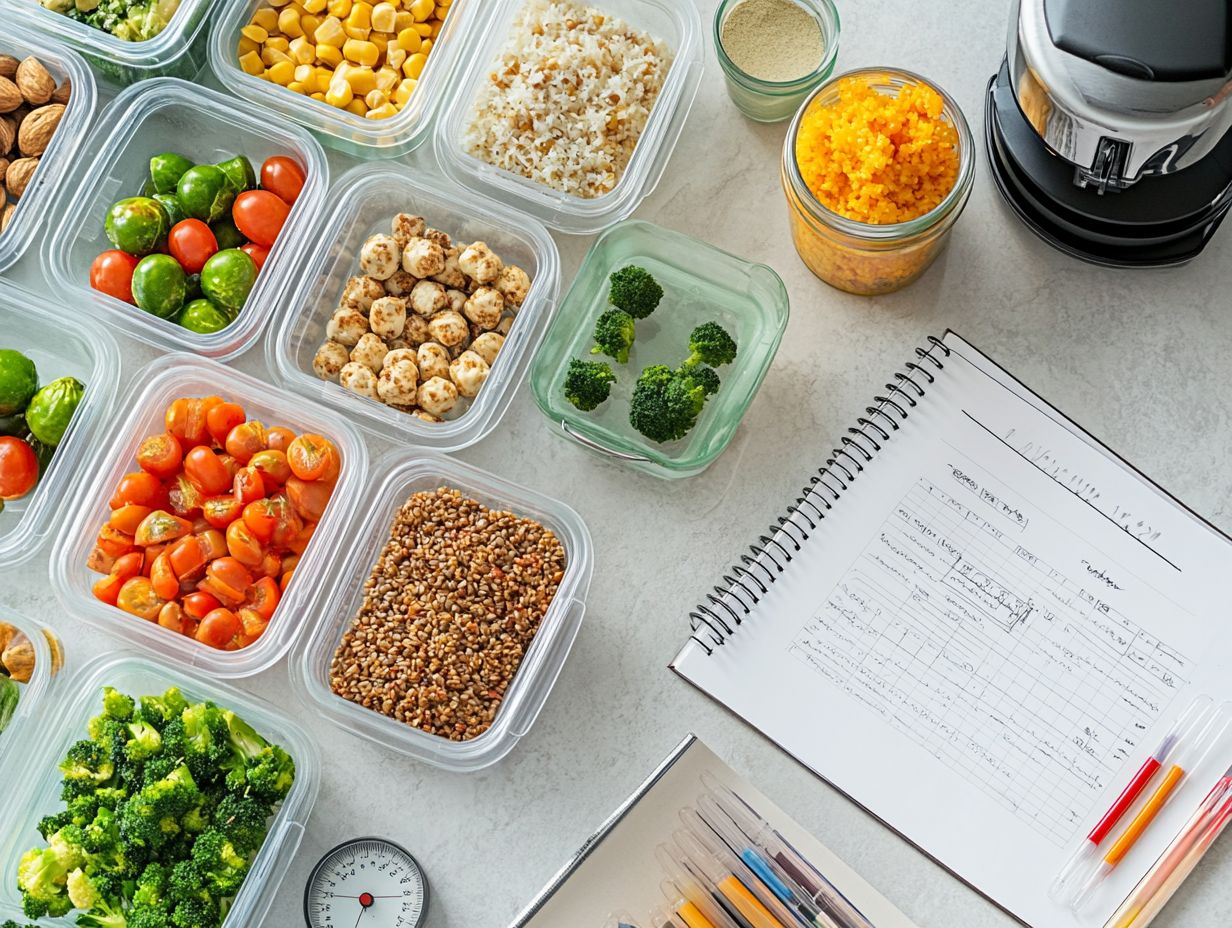
Portion control refers to the art of managing serving sizes within the framework of balanced diets and healthy eating. This practice ensures that you consume appropriate amounts of various food groups and nutrients.
By mastering this concept, you can regulate your caloric intake. This fosters better nutritional habits that align with your health goals.
Understanding serving sizes is vital. For example, the recommended daily servings of fruits and vegetables can vary significantly based on your individual health needs. This awareness helps you balance nutrients like proteins, fats, and carbohydrates.
Recognizing the proper portions of whole grains and dairy can assist in maintaining your energy levels and supporting weight management.
Ultimately, by applying portion control, you can enhance your overall dietary patterns, paving the way for improved health outcomes and longevity.
Why is it Important?
The significance of portion control cannot be overstated; it s essential for preventing obesity, fostering healthy eating habits, and maintaining a balanced diet. This makes it a crucial element in nutrition education.
Understanding serving sizes can lower the risk of overeating. This is often the gateway to weight gain and other health issues.
This is where help from a dietitian becomes invaluable. They provide guidance on visual cues for ideal portion sizes like using smaller plates or measuring cups.
They also share strategies such as mindful eating techniques, encouraging you to listen closely to your hunger cues.
Workshops and personalized meal plans are just a couple of ways dietitians enable you to adopt sustainable habits that yield long-term health benefits.
How Meal Planning Can Help with Portion Control
Meal planning is a game-changer for mastering portion control! By taking the time to plan your meals, you can craft balanced dishes that align seamlessly with your nutritional goals.
This approach not only simplifies the organization of your meals but also enhances your cooking skills, making the entire process more enjoyable and efficient.
Creating Balanced Meals
Creating balanced meals means thoughtfully incorporating a variety of food groups, including healthy fats, robust protein sources, and a colorful array of fruits and vegetables essential elements for effective meal planning.
To achieve nutritional balance, it s vital to pay attention to portion sizes and the diversity of what s on your plate.
Adding whole grains can boost fiber intake, while lean proteins play a key role in muscle repair and overall satisfaction.
When selecting your ingredients, consider choosing seasonal produce. Not only does it elevate flavor, but it also ensures you re getting the most nutrients possible.
Don t shy away from experimenting with different cooking methods grilling, steaming, or roasting can transform healthy eating into a delightful experience.
Lastly, label reading and meal prepping enable you to make informed choices that align with your dietary goals, all while embracing a holistic approach to wellness.
Controlling Portion Sizes
Controlling portion sizes is essential to your meal planning, and it can be effortlessly achieved through visual cues and a solid understanding of serving sizes. This approach not only promotes healthy eating but also enhances your food management skills.
By incorporating tools like portion control plates, you can visually assess what constitutes a healthy serving, making it significantly easier to sidestep the pitfalls of overeating.
These plates often come with designated sections for proteins, grains, and veggies, acting as a built-in nudge to help you balance your meals.
Using smaller bowls and plates can cleverly trick your eye into feeling satisfied with less, while measuring cups and food scales provide a reliable way to establish accurate portion guidelines.
Consistently applying these strategies during mealtimes can help you foster healthier eating habits, paving the way for effective weight management and overall wellness.
Start using these tips today to take control of your eating habits and boost your well-being!
Tips for Successful Meal Planning and Portion Control
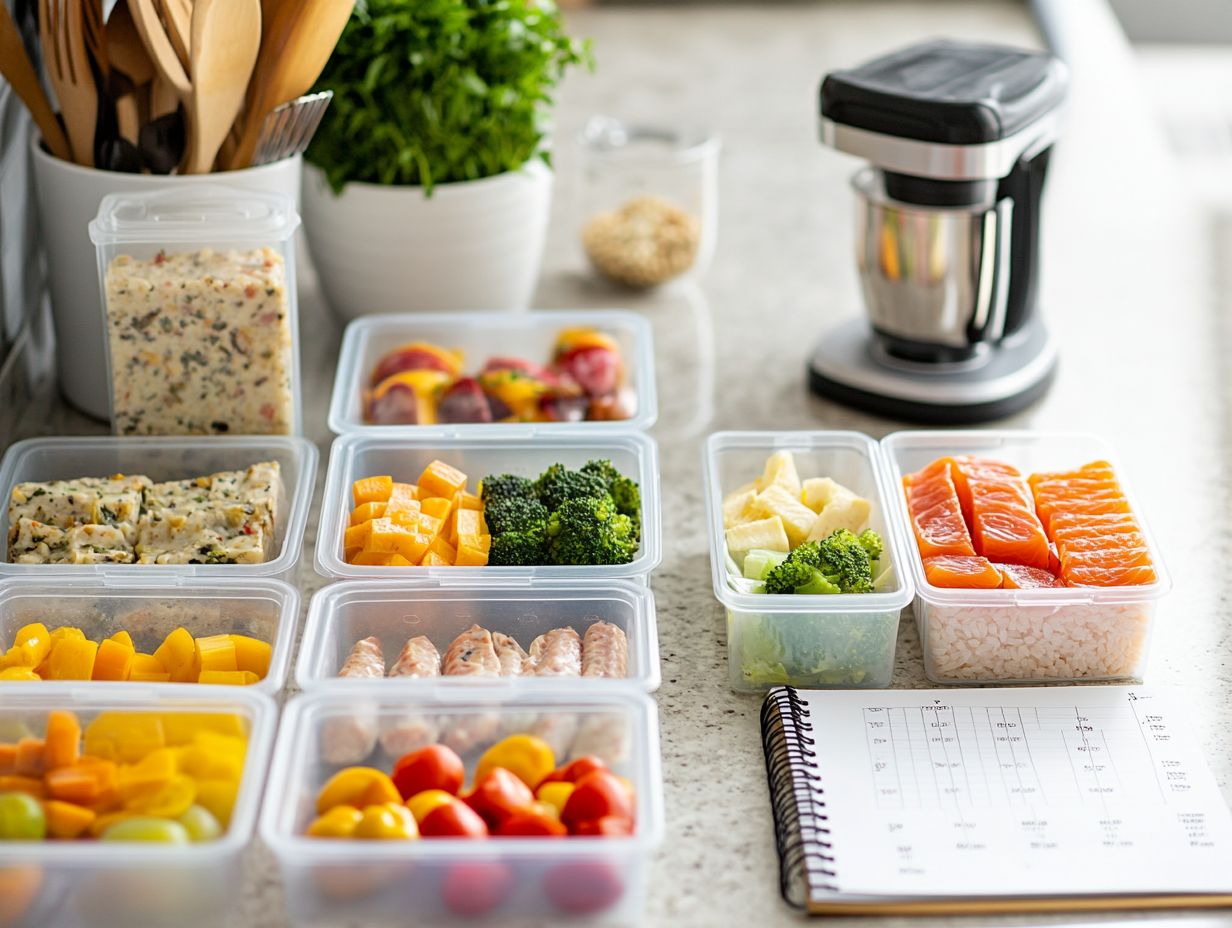
Achieving successful meal planning and mastering portion control is entirely within your reach through practical strategies. By embracing efficient cooking tips and generating a variety of meal ideas, you can enjoy cooking more while seamlessly aligning with your time management goals.
Simple Tips for Delicious Meals
Implementing practical strategies, such as refining your cooking habits and mastering effective grocery shopping, can significantly improve your meal planning and portion control. This leads to greater meal variety and enhances your overall ability to manage your food.
By adopting these methods, you can save time and make smarter choices that positively impact your dietary habits. Creating a weekly meal plan helps you pinpoint the ingredients needed for diverse recipes, effectively breaking the cycle of meal monotony.
Crafting a grocery list ensures that you only purchase essentials, minimizing tempting impulse buys and reducing waste. Incorporating batch cooking and portioning techniques provides you with convenient, ready-to-eat meals, making healthy eating a breeze throughout the week.
These strategies promote a more sustainable approach to food consumption, perfectly aligning with your personal health goals.
Watch Out for These Mistakes!
Being aware of common pitfalls in meal planning and portion control is crucial for maintaining effective time management and promoting healthy eating habits. This awareness optimizes your food management and enhances your overall nutrition knowledge.
Understanding these challenges enables you to take proactive steps toward better eating practices. For instance, underestimating portion sizes often leads to overeating. A lack of variety in meal options can cause boredom and derail your health goals.
To overcome these challenges, adopt a balanced approach. Incorporate diverse foods and be mindful of your serving sizes, making it easier to stay on track.
Embracing tools like meal prep containers and food scales, along with setting designated meal times, can significantly enhance your ability to navigate these obstacles while keeping your focus on mindful eating and efficient time management.
Frequently Asked Questions
How are meal planning and portion control connected?
Meal planning and portion control are closely linked because the role of meal planning in healthy eating allows for better control of portion sizes. By planning out meals ahead of time, you can ensure that you’re eating the right amounts of each food group and avoiding overeating.
How does meal planning help with portion control?
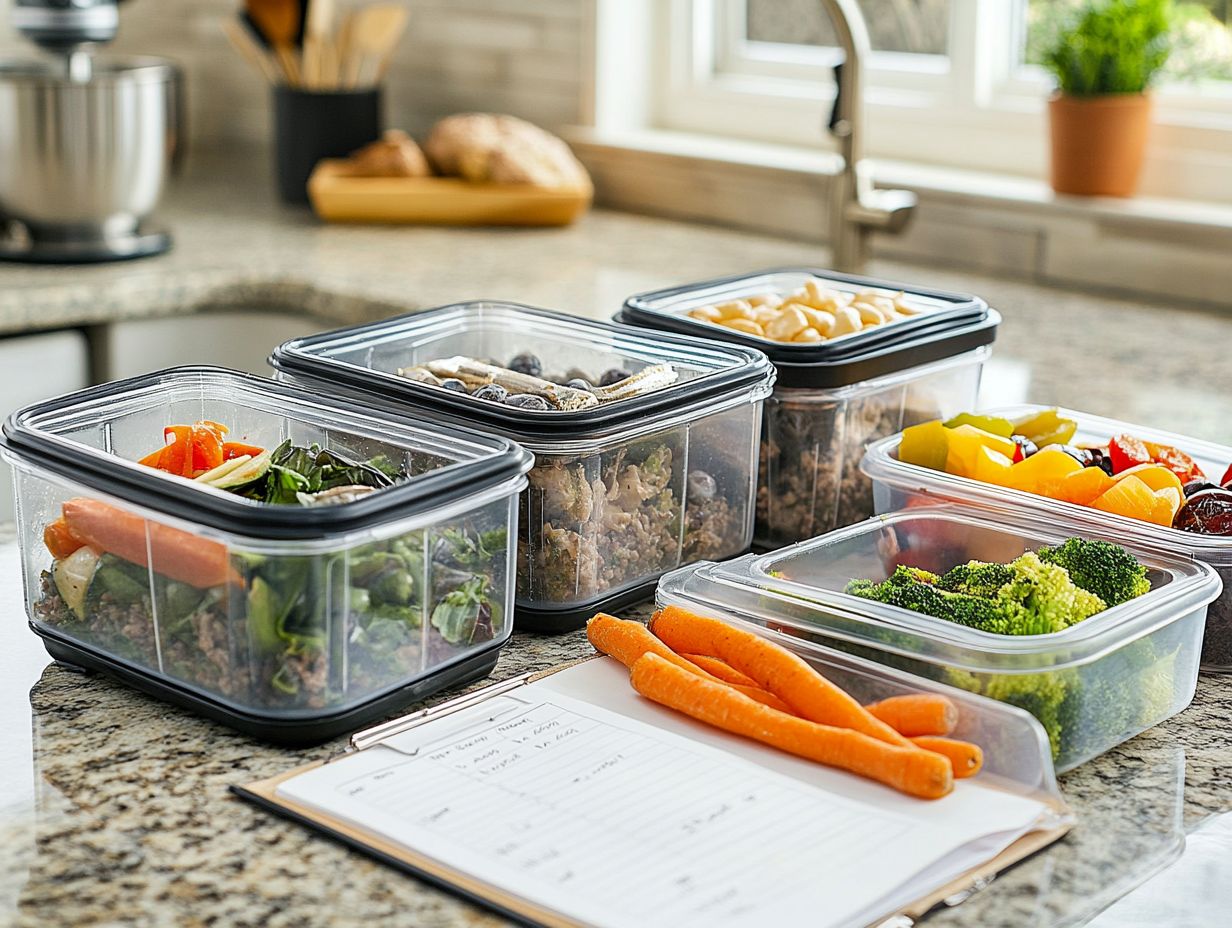
Meal planning assists with portion control by allowing you to portion out and prepare meals in advance. This prevents the temptation to eat larger portions or reach for unhealthy snacks when you’re short on time or feeling hungry.
What are the benefits of practicing portion control?
Practicing portion control offers many benefits, including weight management, improved digestion, and better overall health. Controlling portion sizes can also help regulate blood sugar levels and reduce the risk of chronic diseases such as diabetes and heart disease.
How can meal planning and portion control be incorporated into a busy lifestyle?
Both meal planning and portion control can be easily integrated into a busy lifestyle by dedicating a small amount of time each week to plan and prepare meals. This saves time and money, reduces stress, and promotes healthier eating habits.
Are there any tips for successful meal planning and portion control?
Some effective tips for successful meal planning and portion control include setting specific portion size goals, using smaller plates and containers, measuring out ingredients, and including a variety of nutritious foods in your meal plan.
Ready to take charge of your eating habits? Start meal planning today!
How can meal planning and portion control benefit those with specific dietary needs or restrictions?
Meal planning and portion control can greatly help individuals with specific dietary needs. By planning meals and managing portion sizes, you can get the nutrients you need.
This approach also helps you avoid foods that might make your situation worse, leading to a healthier and more enjoyable eating experience.
Transform your meals and take charge of your health today!

